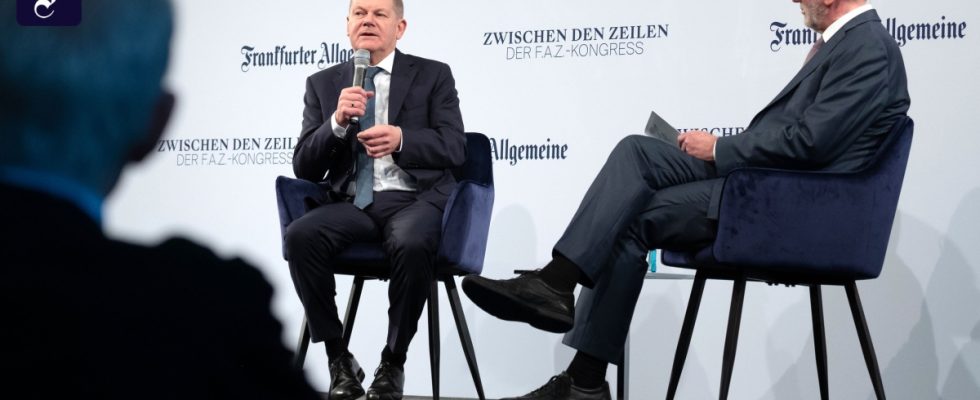MIt is now more than a year since Russia attacked Ukraine – an event that Chancellor Olaf Scholz (SPD) called a “turning point” in a government statement a short time later. The Federal Ministry of Defense is now under new management, but the troops have hardly received any of the 100 billion euro special fund.
Scholz was nevertheless optimistic on Friday in Frankfurt that the Bundeswehr’s equipment would soon be noticeably better: “We will have a defense economy that can serve our security interests in the long term,” said Scholz at the FAZ congress “Between the Lines” on the Frankfurter Goethe University. Ongoing production of weapons and ammunition is good – and there will be “relevant” production of ammunition for the Cheetah tank as early as late summer.
“We feel what kind of wrong decisions have been made in the past,” said Scholz when asked by FAZ editor Berthold Kohler why the special fund has so far hardly reached the troops. According to the Chancellor, it is necessary to conclude long-term contracts with armaments companies and to plan ahead. Scholz does not see that he has held on to the recently resigned Defense Minister Christine Lambrecht (SPD) for too long.
“Where would we end up?”
It cannot be that Russia now wants to move its borders with reference to earlier conditions. “Where would we be if that were to determine the security order in Europe?” said Scholz. It was the great achievement of the détente policy of the 1970s that no borders were pushed by force. That is the consensus in Germany. “And you can expect the same from others, otherwise the peace is endangered.” Ukraine must not lose, there must be no “Russian dictated peace,” said Scholz, earning applause from the audience at the FAZ Congress.
As far as the migration crisis is concerned, Scholz campaigned for so-called migration partnerships and increased immigration of skilled workers who were urgently needed. “We need the digitization of the immigration authorities,” demanded the Chancellor. “I ask myself: Where do we actually live, almost ten years after 2014/2015 I heard that maybe a tenth of the immigration authorities are digitized. That can’t be true.” Scholz asked why couldn’t electronic files simply be sent from immigration authority to immigration authority. “I think this work has to be done.”

Federal Chancellor Olaf Scholz is greeted by FAZ publisher Berthold Kohler on his arrival at the FAZ Congress.
:
Image: Lucas Bäuml
At the FAZ Congress, Scholz rejected the Greens’ demand that climate protection issues should be discussed again after the long meeting of the coalition committee. “We have found a very final clarification on questions that have not been clarified for many years,” said Scholz on the main political panel. After the 30-hour negotiations, which mainly focused on climate protection and infrastructure issues, the Greens in the traffic light coalition in particular were dissatisfied. “It is not surprising that there is a lot to discuss,” said Scholz. “A lot has grown over the decades.” Many regulations have been added that slow down planning projects. “The solutions for this are not obvious.”
The Ukraine war was a topic at the congress again and again, including in the morning. Former Austrian Chancellor Sebastian Kurz answered questions from the FAZ editors Helene Bubrowski and Simon Strauss. He has visited Ukraine “countless times” and made “many friends” there, said the 36-year-old former politician-turned-entrepreneur. Kurz was foreign minister when Russia annexed Crimea in 2014.

Sebastian Kurz in conversation with Helene Bubrowski and Simon Strauss.
:
Image: Lucas Bäuml
“The war cannot be justified in any way,” said Kurz. It is right that the West is now resolutely opposing Moscow and that the states are adapting their energy policies to the new situation. However, Kurz did not want to say whether a different attitude on the part of the West towards Moscow could have changed the political situation. “I don’t have a final opinion on that,” he said in the “Young Minds” panel.
